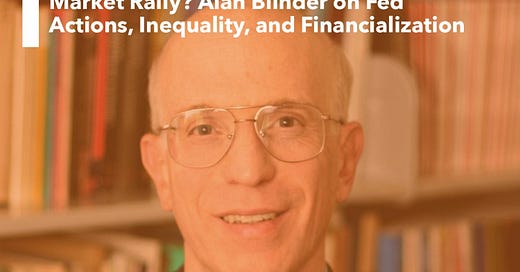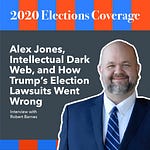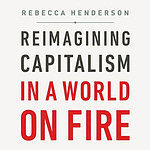Alan Blinder was the Vice Chairman of the Board of Governors of the Federal Reserve System under President Bill Clinton. In this episode, we seek to answer questions on the Fed’s unprecedented actions in light of the COVID-19 crisis and their long-term implications, from whether the injection of liquidity is propping up the financial markets in unhealthy ways, to whether the lack of coordination between fiscal and monetary policies could potentially exacerbate inequality like after the 2008 financial crisis… We say that the Fed’s actions have been unprecedented because it not only pledged to buy an unlimited quantity of government debt, but also decided to support even some of the riskiest corporate bonds; it lowered the target rate to 0-0.25 percent and announced in the June FOMC meeting that it’s not even “thinking about thinking about raising rates…” Is the Fed well-equipped to mitigate the economic effects of a pandemic? In the process, how can we manage the public expectation so that the Fed is not being given “mission impossibles?” The Fed’s “Main Street” lending to small/medium sized businesses has somewhat pushed the Fed to uncharted territory. While Prof. Blinder believes that the Fed is doing a better job of injecting money into Main Street than it did in 2008, he acknowledges that the Fed is primarily equipped to support large corporations, and as such may play a role in exacerbating inequality. He also argues that the financial system has grown too large, to the point where “the tail is wagging the dog.” An expert on the 2008 financial crisis, Prof. Blinder walks us through a series of critical comparisons. Today’s crisis is not one created by housing bubbles or elaborate financial instruments, so there generally seems to be less resentment among everyday Americans towards financial elites. But by stepping into junk bond territory, the Fed has effectively backstopped some of the biggest names in the hedge fund and private equity industry and some of the most aggressive speculators. Will there be a strong reaction against financial elites similar to the one we saw in 2008-09 with the Occupy Wall Street movement? A lot of studies have been done on how the 2008 financial crisis bailout exacerbated inequality in the U.S. One reason often given by economists and journalists is that the monetary policy response was adequate, but the fiscal stimulus didn’t follow suit. How do we ensure that the same doesn’t happen again? How can the Fed and the Treasury be smarter and attach more conditions to the loans and grants they make to large corporations? In a recent Wall Street Journal op-ed, Prof. Blinder dismissed concerns over the inflationary impact of the Fed’s radical monetary policies as “Scarlett O’Hara questions” about the long-term effects of the Fed’s monetary policy – specifically on the deficit and on inflation. He argues that these potential issues are not particularly pressing or worrisome and that these are questions to be dealt with after the coronavirus crisis is averted: “I’ll think about that tomorrow.” In this episode, we probe deeper into the reasoning behind this idea, and whether the fear of the deficit or inflation might undermine the economic recovery in the short and long run. Full bio: Alan Blinder is the Gordon S. Rentschler Memorial Professor of Economics and Public Affairs at Princeton University. He previously served as the Vice Chairman of the Board of Governors of the Federal Reserve System under Bill Clinton, as well as on Clinton’s Council of Economic Advisors. Blinder is one of the leading voices in the discourse surrounding fiscal and monetary policy, and has written many best-selling books, including the latest “Advice and Dissent: Why America Suffers When Economics and Politics Collide.”
1×
0:00
Current time: 0:00 / Total time: -42:51
-42:51
Is the Fed Secretly Behind the Stock Market Rally? Alan Blinder on Fed, Inequality, Financialization
Jul 12, 2020














Share this post